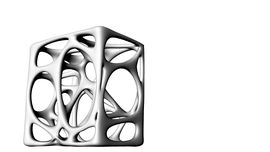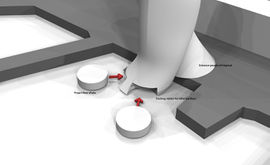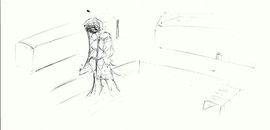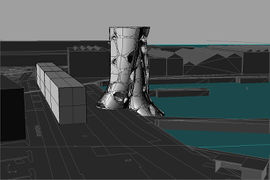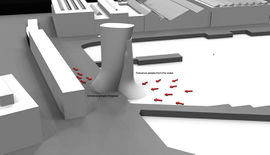From rerdm
(Difference between revisions)
|
|
| Line 37: |
Line 37: |
| | Context meet in architecture | | Context meet in architecture |
| | | | |
| − | The village Heijplaat is built in 1914 as result of the remote area of the RDM factory. The employees had to travel a far distance and the owner of the factory decides he wants his employees close to the factory. In 1983 the factory had gone bankrupt as result of that the whole community not only lost their jobs but also the reason to exist. | + | The village Heijplaat is built in 1914 as result of the remote area of the RDM factory. The employees had to travel a far distance and the owner of the factory decides he wants his employees close to the factory. For more than 69 years the main employer was the RDM factory, but in 1983 the factory had gone bankrupt. As result of that the whole community not only lost their jobs but also the reason to exist. |
| | | | |
| − | The concept of the project is to renew the RDM factory as a center for the village. Not to work but to enjoy the surrounding as a former harbor. The rough materials, remote area and the large buildings give the RDM factory his identity. The addition of 3000 people creates the need for more activities then just education. To make the surrounding more attractive also during the evening for the people the project provides a restaurant. The project stands in contrast with his surrounding; it creates a friendlier environment where people can meet.The project provides his goods for the restaurant in the form of urban farming in the top of the tower. The project is more than just a restaurant it’s also a docking-station for floating pavilions. At the bottom of the tower there activities located that supported the floating hotel rooms of the Veni-Vidi project. The structure is based on a 3d voronoi and creates a natural surrounding with a human scale.
| + | In 2009 the RDM was formed into the RDM campus, a place where research, design and manufacturing take place. It became a success and after the College of Rotterdam established more companies were interested and settle there. Looking at the RDM as a campus it became a success, but in a wider perspective the place became an enclave and lost the connection with the village of Heijplaat. |
| | | | |
| − | '''Provide food'''
| + | The next step in the development is the reRDM an ongoing project consisting 25 architectural designs. The 25 interventions are different in nature but relay direct or indirect on people from outside the RDM campus. To increase the right conditions for further development 3000 people will be added to the surrounding. This addition creates the need for more than just education activities. The project Vfood Restaurant responds on those needs in the form of a restaurant. The Vfood Restaurant also attempts to re-establish the relation with the village of Heijplaat and make it more attractive during the evening. |
| | | | |
| − | '''Enjoy food'''
| + | The fact that the area is secluded is reflecting in the Vfood Restaurant. Above the restaurant urban farming is providing the goods for the restaurant. This makes the restaurant less depending and brings the ingredients closer to the people. |
| − | | + | |
| − | '''Collecting people'''
| + | |
| − | | + | |
| − | One of the forgotten needs of urban farming is the nutrients. Traditional the ground provide the nutrients the plant’s needs. In case of urban farming there is designed not enough ground to providing the nutrients or in some cases the ground disappeared completely.
| + | |
| − | | + | |
| − | | + | |
| − | [[File:Sketch3 22.jpg|270px]]
| + | |
| − | [[File:Diagram 22.jpg|270px]]
| + | |
| | | | |
| | ==Connections== | | ==Connections== |
Revision as of 23:03, 25 November 2012
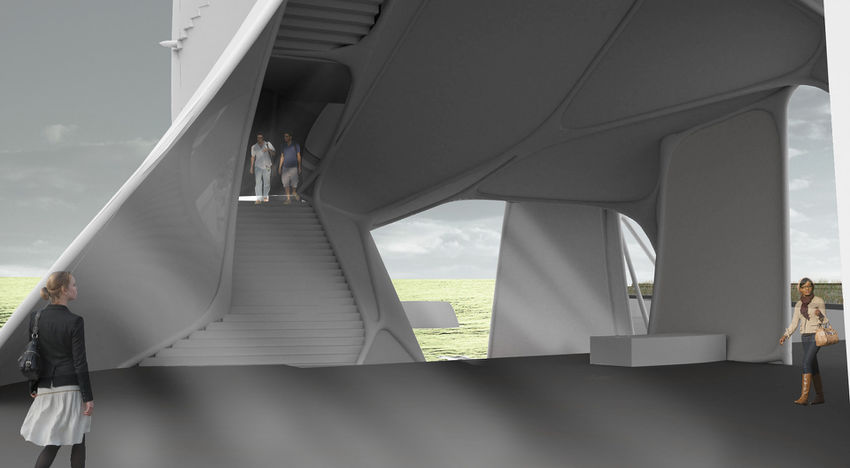
VFOOD RESTAURANT
author(s):Mitchel Verkuijlen
Summary
Context meet in architecture
The village Heijplaat is built in 1914 as result of the remote area of the RDM factory. The employees had to travel a far distance and the owner of the factory decides he wants his employees close to the factory. For more than 69 years the main employer was the RDM factory, but in 1983 the factory had gone bankrupt. As result of that the whole community not only lost their jobs but also the reason to exist.
In 2009 the RDM was formed into the RDM campus, a place where research, design and manufacturing take place. It became a success and after the College of Rotterdam established more companies were interested and settle there. Looking at the RDM as a campus it became a success, but in a wider perspective the place became an enclave and lost the connection with the village of Heijplaat.
The next step in the development is the reRDM an ongoing project consisting 25 architectural designs. The 25 interventions are different in nature but relay direct or indirect on people from outside the RDM campus. To increase the right conditions for further development 3000 people will be added to the surrounding. This addition creates the need for more than just education activities. The project Vfood Restaurant responds on those needs in the form of a restaurant. The Vfood Restaurant also attempts to re-establish the relation with the village of Heijplaat and make it more attractive during the evening.
The fact that the area is secluded is reflecting in the Vfood Restaurant. Above the restaurant urban farming is providing the goods for the restaurant. This makes the restaurant less depending and brings the ingredients closer to the people.
Connections
01NAME, 02NAME
<comments/>

